
views
New Delhi: The controversial Goods and Services Tax Bill will have to wait more. The Monsoon session of Parliament has ended in a complete washout as all appeals by the Central government to let the government function were drowned amidst the voices of the implacable Congress.
However, still keen to ensure passage of the GST bill, Centre is keeping its option open of reconvening the session with the Cabinet Committee on Parliamentary Affairs on Thursday deciding not to recommend immediate prorogation of the Houses after they are adjourned sine die.
According to sources, the decision to reconvene Monsoon session, after the washout of last three weeks due to disruptions by Congress-led opposition, will depend on whether there is some significant headway with other parties on the contentious GST bill.
If the government manages to rope in some regional parties and chooses to press for the GST bill, then it may call for reconvening the Monsoon session for few days. The non-prorogation of the Houses after they are adjourned sine die on Thursday will enable it to reconvene them at a short notice.
With some regional parties like BJD, SP and INLD voicing disapproval of the disruptions in Parliament, there is a view in the government that the pro-reform measure GST can be pushed. Trinamool Congress had already backed the Bill. Government is also trying to bring NCP on board on the GST.
According to the Bill, Parliament and state legislatures will have concurrent powers to make laws on GST. The Bill also amends the Constitution to introduce the tax (GST). The GST Council will recommend rates of tax, period of levy of additional tax, principles of supply, special provisions to certain states etc. The GST Council will consist of the Union Finance Minister, Union Minister of State for Revenue, and state Finance Ministers.
The idea behind GST is to subsume all existing central and state indirect taxes under one value added tax, which will be levied on all goods and services. No good or service is exempt, and there is no differentiation between a good or service, whether as an input or as a finished product.
Under GST, tax paid on inputs is deducted from the tax payable on the output produced. This input credit set off operates through the manufacturing and distribution stage of production. The tax is collected only at the place of consumption. This design addresses cascading of taxes.
The government had introduced the Bill on Tuesday but a debate on it was blocked by a vociferous Congress which raised procedural issues.




















Comments
0 comment